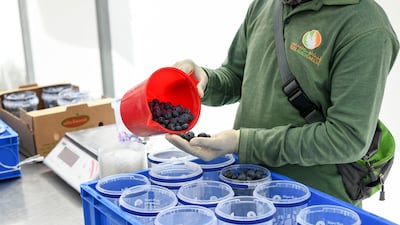A plan to develop plant varieties and animal breeds that are better suited to the UAE’s environmental conditions has been unveiled by Abu Dhabi's government.
The Abu Dhabi Agricultural Genome Programme will involve scientific research centres carrying out work to create the new varieties and breeds.
It will also see the setting up of a database of genetic resources and a store of actual material, an approach that, elsewhere, has often resulted in the creation of seed banks.
The initiative has been launched by the Abu Dhabi Authority for Agriculture and Food Safety (ADAFSA) and is part of the authority’s 2022 to 2025 strategic plan to enhance food security.
As well as enhancing food security – a key aim in a country that is a net importer of food – officials also want agriculture to make an increased contribution to Abu Dhabi emirate’s GDP.
In a statement, the Abu Dhabi Government Media Office said the programme would improve agricultural production and meet “the challenges of the emirate’s climatic and environmental conditions”.
The plant varieties and fish and animal breeds developed through the programme will be particularly suited to the UAE’s climate, which is characterised by high temperatures, low rainfall and, in some cases, high salinity levels in soil.
In line with this, ADAFSA said in the statement that tolerance of drought and high salinity would be a key aim of breeding programmes.

An additional aim is to develop plants, fish and farm animals that are resistant to disease. Better disease resistance, which has for many decades been a priority of, in particular, plant-breeding programmes around the world, can improve yields and reduce the cost of production.
Sheikh Mansour bin Zayed, Deputy Prime Minister, Minister of Presidential Affairs and ADAFSA’s chairman, said the programme would help to train Emiratis in agricultural genetic research. Sheikh Mansour said the initiative was part of the UAE’s move towards “global leadership in food security”.
Also as part of its efforts to improve the supply of locally grown food, last month ADAFSA awarded two contracts, worth Dh310 million in total, for the creation of a hydroponic farm in the Abu Dhabi region and a conventional farm in Al Ain.
Hydroponic farms, which have previously been set up in the UAE and neighbouring countries including Saudi Arabia, involve growing crops in nutrient solutions instead of soil. While often energy intensive, the approach reduces water consumption.

